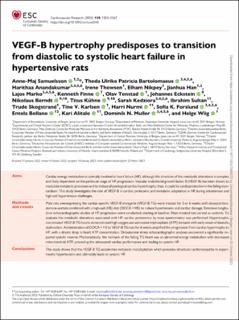| dc.contributor.author | Samuelsson, Anne-Maj | |
| dc.contributor.author | Bartolomaeus, Theda Ulrike Patricia | |
| dc.contributor.author | Anandakumar, Harithaa | |
| dc.contributor.author | Thowsen, Irene Matre | |
| dc.contributor.author | Nikpey, Elham | |
| dc.contributor.author | Han, Jianhua | |
| dc.contributor.author | Marko, Lajos | |
| dc.contributor.author | Finne, Kenneth | |
| dc.contributor.author | Tenstad, Olav | |
| dc.contributor.author | Eckstein, Johannes | |
| dc.contributor.author | Berndt, Nikolaus | |
| dc.contributor.author | Kühne, Titus | |
| dc.contributor.author | Kedziora, Sarah | |
| dc.contributor.author | Sultan, Ibrahim | |
| dc.contributor.author | Skogstrand, Trude | |
| dc.contributor.author | Karlsen, Tine Veronica | |
| dc.contributor.author | Nurmi, Harri | |
| dc.contributor.author | Forslund, Sofia K. | |
| dc.contributor.author | Bollano, Entela | |
| dc.contributor.author | Alitalo, Kari | |
| dc.contributor.author | Muller, Dominik N. | |
| dc.contributor.author | Wiig, Helge | |
| dc.date.accessioned | 2023-10-18T09:34:13Z | |
| dc.date.available | 2023-10-18T09:34:13Z | |
| dc.date.created | 2023-09-26T10:58:26Z | |
| dc.date.issued | 2023 | |
| dc.identifier.issn | 0008-6363 | |
| dc.identifier.uri | https://hdl.handle.net/11250/3097227 | |
| dc.description.abstract | Aims: Cardiac energy metabolism is centrally involved in heart failure (HF), although the direction of the metabolic alterations is complex and likely dependent on the particular stage of HF progression. Vascular endothelial growth factor B (VEGF-B) has been shown to modulate metabolic processes and to induce physiological cardiac hypertrophy; thus, it could be cardioprotective in the failing myocardium. This study investigates the role of VEGF-B in cardiac proteomic and metabolic adaptation in HF during aldosterone and high-salt hypertensive challenges.
Methods and results: Male rats overexpressing the cardiac-specific VEGF-B transgene (VEGF-B TG) were treated for 3 or 6 weeks with deoxycorticosterone-acetate combined with a high-salt (HS) diet (DOCA + HS) to induce hypertension and cardiac damage. Extensive longitudinal echocardiographic studies of HF progression were conducted, starting at baseline. Sham-treated rats served as controls. To evaluate the metabolic alterations associated with HF, cardiac proteomics by mass spectrometry was performed. Hypertrophic non-treated VEGF-B TG hearts demonstrated high oxygen and adenosine triphosphate (ATP) demand with early onset of diastolic dysfunction. Administration of DOCA + HS to VEGF-B TG rats for 6 weeks amplified the progression from cardiac hypertrophy to HF, with a drastic drop in heart ATP concentration. Dobutamine stress echocardiographic analyses uncovered a significantly impaired systolic reserve. Mechanistically, the hallmark of the failing TG heart was an abnormal energy metabolism with decreased mitochondrial ATP, preceding the attenuated cardiac performance and leading to systolic HF.
Conclusions: This study shows that the VEGF-B TG accelerates metabolic maladaptation which precedes structural cardiomyopathy in experimental hypertension and ultimately leads to systolic HF. | en_US |
| dc.language.iso | eng | en_US |
| dc.publisher | Oxford University Press | en_US |
| dc.rights | Navngivelse-Ikkekommersiell 4.0 Internasjonal | * |
| dc.rights.uri | http://creativecommons.org/licenses/by-nc/4.0/deed.no | * |
| dc.title | VEGF-B hypertrophy predisposes to transition from diastolic to systolic heart failure in hypertensive rats | en_US |
| dc.type | Journal article | en_US |
| dc.type | Peer reviewed | en_US |
| dc.description.version | publishedVersion | en_US |
| dc.rights.holder | Copyright 2023 the authors | en_US |
| cristin.ispublished | true | |
| cristin.fulltext | original | |
| cristin.qualitycode | 2 | |
| dc.identifier.doi | 10.1093/cvr/cvad040 | |
| dc.identifier.cristin | 2178914 | |
| dc.source.journal | Cardiovascular Research (CVR) | en_US |
| dc.source.pagenumber | 1553-1567 | en_US |
| dc.identifier.citation | Cardiovascular Research (CVR). 2023, 119 (7), 1553-1567. | en_US |
| dc.source.volume | 119 | en_US |
| dc.source.issue | 7 | en_US |

